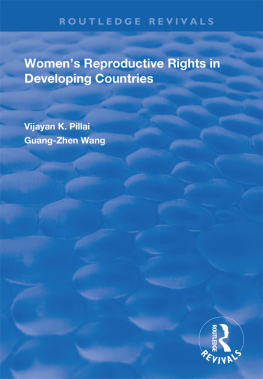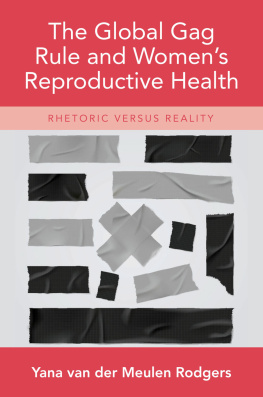GLOBAL FLUIDS
Fertility, Reproduction and Sexuality
GENERAL EDITORS:
Soraya Tremayne, Founding Director, Fertility and Reproduction Studies Group and Research Associate, Institute of Social and Cultural Anthropology, University of Oxford.
Marcia C. Inhorn, William K. Lanman, Jr. Professor of Anthropology and International Affairs, Yale University.
Philip Kreager, Director, Fertility and Reproduction Studies Group, and Research Associate, Institute of Social and Cultural Anthropology and Institute of Human Sciences, University of Oxford.
For a full volume listing please see back matter.
GLOBAL FLUIDS
THE CULTURAL POLITICS OF REPRODUCTIVE WASTE AND VALUE
Charlotte Krolkke
First published in 2018 by
Berghahn Books
www.berghahnbooks.com
2018 Charlotte Krolkke
All rights reserved. Except for the quotation of short passages for the purposes of criticism and review, no part of this book may be reproduced in any form or by any means, electronic or mechanical, including photocopying, recording, or any information storage and retrieval system now known or to be invented, without written permission of the publisher.
Library of Congress Cataloging-in-Publication Data
Names: Krolkke, Charlotte, author.
Title: Global fluids: The Cultural Politics of Reproductive Waste and Value / Charlotte Krolkke.
Description: New York: Berghahn Books, 2018 | Series: Fertility,
Reproduction and Sexuality; 39 | Includes bibliographical references and index.
Identifiers: LCCN 2018015958 (print) | LCCN 2018023952 (ebook) | ISBN 9781785338939 (eBook) | ISBN 9781785338922 (hardback: alk. paper)
Subjects: LCSH: Human reproductive technology. | Human reproduction.
Classification: LCC RG133.5 (ebook) | LCC RG133.5 .K76 2018 (print) | DDC 618.1/7806--dc23
LC record available at https://lccn.loc.gov/2018015958
British Library Cataloguing in Publication Data
A catalogue record for this book is available from the British Library.
ISBN 978-1-78533-892-2 hardback
ISBN 978-1-78533-893-9 ebook
To Theo and Valentin
for their laughter and love
FIGURES AND ILLUSTRATIONS
ACKNOWLEDGMENTS
T his book owes a great deal to many colleagues, friends, students, and family members. Thank you to the University of Southern Denmark for funding the research project Reproductive Medicine and Mobility (REMM) and to the group of fun REMM colleagues: Karen Hvidtfeldt Madsen, Matilde Lykkebo Petersen, Frank Hgholm Pedersen, Kent Kristensen, Tine Tjrnhj-Thomsen, Jens Fedder, and Michael Nebeling Petersen. I am grateful that several of you volunteered to read and comment on earlier drafts: thank you Michael Nebeling for always providing inspirational comments, and thank you Dag Heede for your generosity and sharp analytical skills that always push me to improve my work.
Institutional support and funding agencies have made my research and writing easier: Thank you to Anne Jensen for your administrative support, and to Marianne Lysholt, Lene Vivi Petersen, and Dorte Winther for assistance in administering my, at times, impressive amount of travel receipts. Thank you also to the Danish Research Council, which twice supported my study.
An inspiring and wonderful group of collaborators has been crucial throughout: Thank you to Karen A. Foss and Elizabeth Dickinson, whose work on placentas as forms of communication was pivotal to me. Thank you Stine Willum Adrian, Janne Rothmar Herrmann, Katherine Carroll, Jette Rygaard, Filareti Kotsi, Catherine Waldby, Yael Hashiloni-Dolev, Kinneret Lahad, Ayo Wahlberg, Lene Myong, Hiromi Tanaka, Minori Kokado, Nicky Hudson, Lorraine Culley, Kathrin Maurer, and Chia-Ling Wu for your encouragements and ideas. Thank you also to the clinical collaborators Yael Kramer, David Keefe, Lucy Lu, David McCulloh, Cristina Pozzobon, Jurie van den Elsenwithout your support and openness this research would not have been possible. Thank you to wonderful research assistants: Anne Vestergaard Yousufi, Hanne Poulsen, and Lone Sommer, and thank you to Marcia Inhorn who continues to impress and inspire.
A very special thank you to my sister whose strength and insight I greatly admire, and to the Five College Womens Studies Research Center, including Nayiree Roubinian and Jennifer Hamilton, who so generously granted me a research stay at Mount Holyoke College during which I completed my work.
And last but certainly not least, thank you to Michael Warnock, whose patience and understanding has been invaluable, and to our sons Theo and Valentin, whose presence always reminds me of what really matters. This book is for you!
INTRODUCTION

T he body has become a goldmine of usable parts (Jones 2016). In the United States, a woman may earn $20,000 to $35,000 as a surrogate; a sperm provider will receive in the range of $35 to $200 for his gametes, while egg donation ranges between $5,000 and $10,000 (Jones 2016). Other bodily parts are usable as well: hair can be sold (price depends on color, thickness, length, and ethnicity of donor, but generally ranges between $100 and $4,000 at stool can now be provided to the organization OpenBiome, which redistributes it to help treat individuals suffering from gastrointestinal distress (annual compensation of approximately $13,000) (Alter 2016; Morgan 2016); whole bodies can temporarily be donated to NASA, who will pay $18,000 if the provider is willing to lie in bed for 70 days (Morgan 2016), while a single cadaver may generate between $110,000 and $222,000 in potential fees and revenue (Parry 2007: 1138). What may be considered bodily waste, usable parts, vacant bodies, or simply extractable material has contributed to an emerging relationship between the body and commerce, fueled by scientific and technological progress and developments.
This book is about the ways that pregnant womens urine, placentas, and oocytes become exchangeable. Womens reproductive donations gain (new) meaning throughout their extraction, industrialization, commodification, and consumption processes. I begin the book by outlining and developing a feminist cultural analytical approach to reproductive donations, and I conclude it by extending the analyses of reproductive donations to feminist bioethics and cultural politics. What, I ask, happens to our understanding of urine, oocytes, and placentas when they circulate and become exchangeable? For example, how does a temporary reproductive organ such as the placenta move from being understood as waste, biohazard material, or babys first home to turn up again as a central ingredient in a smoothie, as medicine, and in anti-aging, whitening cream? What is the trajectory that enables pregnant womens urine, commonly framed as waste (best to be avoided, forgotten, and promptly flushed), to be donated and turned into fertility hormones and pregnancy kits? Similarly, how do oocytes through communication, clinical, and cultural practices move from being inside one woman to being extracted, cryopreserved, fertilized, and seen as naturally belonging to another? And what are the moral limits involved that would dictate what reproductive matter or fluids can move into the global marketplace?








